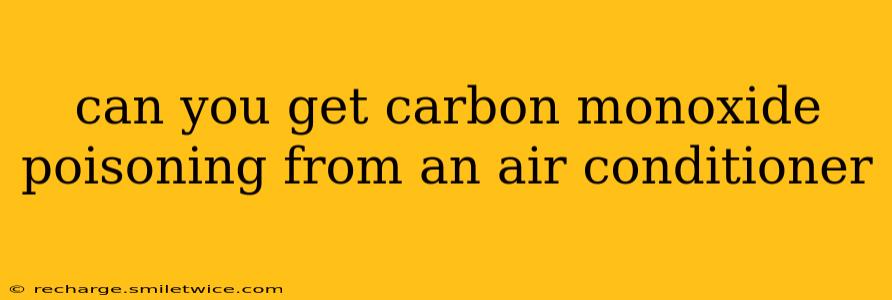Can You Get Carbon Monoxide Poisoning from an Air Conditioner?
Carbon monoxide (CO) poisoning is a serious concern, and understanding its potential sources is crucial for safety. While air conditioners themselves don't produce carbon monoxide, there are scenarios where they can indirectly contribute to CO buildup in your home, leading to potential poisoning. This article will explore these scenarios and answer frequently asked questions surrounding air conditioners and CO poisoning.
Understanding Carbon Monoxide
Before delving into the relationship between air conditioners and CO poisoning, it's essential to understand what carbon monoxide is. CO is a colorless, odorless, and tasteless gas produced when fuels like natural gas, propane, oil, or wood don't burn completely. Inhaling CO can lead to various health problems, from headaches and dizziness to loss of consciousness and even death. The severity depends on the concentration of CO and the duration of exposure.
Can a malfunctioning air conditioner produce carbon monoxide?
No, an air conditioner, in its normal functioning, does not produce carbon monoxide. Air conditioners use refrigerants to cool the air, not combustion processes that generate CO. However, problems with other appliances near the AC unit can indirectly cause CO buildup.
What are the indirect ways an air conditioner might be linked to carbon monoxide poisoning?
Indirectly, an air conditioner can contribute to CO poisoning through several scenarios:
-
Blocked Exhaust Vents: If an appliance that produces carbon monoxide, such as a furnace, water heater, or gas stove, is located near the air conditioner and its exhaust vent is blocked, the CO can accumulate in the house. The air conditioner, while not producing the CO, can then circulate this dangerous gas throughout the home. This is especially dangerous if the air conditioner is operating in a recirculation mode.
-
Improper Installation or Maintenance: Poorly maintained or improperly installed heating systems near the air conditioner, or even the air conditioner itself, can lead to CO leaks. Regular inspections and professional servicing of all appliances are vital.
-
Poor Ventilation: Inadequate ventilation in your home can trap CO from any source, including appliances not directly related to the air conditioner. The AC unit merely distributes the already present CO.
-
Nearby Appliances: Other appliances in close proximity to the air conditioner, such as a gas-powered generator or a malfunctioning internal combustion engine, might release CO that gets circulated by the air conditioner.
What are the symptoms of carbon monoxide poisoning?
Symptoms of carbon monoxide poisoning can mimic the flu, making it difficult to diagnose. These can include:
- Headache
- Dizziness
- Weakness
- Nausea
- Vomiting
- Shortness of breath
- Confusion
- Chest pain
What should I do if I suspect carbon monoxide poisoning?
If you suspect CO poisoning, immediately:
- Get to fresh air. Leave the building immediately.
- Call emergency services. (In the US, call 911)
- Seek medical attention. Even if symptoms seem mild, CO poisoning can have long-term health consequences.
How can I prevent carbon monoxide poisoning related to my air conditioner?
The best way to prevent CO poisoning related to your air conditioner is to ensure the proper functioning and maintenance of all appliances in your home, especially those that burn fuel:
- Regular maintenance: Schedule annual inspections and maintenance for furnaces, water heaters, and other gas appliances.
- Proper ventilation: Ensure adequate ventilation in your home.
- CO detectors: Install and maintain battery-operated or hardwired carbon monoxide detectors on every level of your home, especially near sleeping areas. Test them regularly.
- Professional installation: Ensure all appliances are professionally installed.
In conclusion, while an air conditioner itself cannot produce carbon monoxide, it can inadvertently circulate CO from other sources within your home. Regular maintenance, proper ventilation, and the use of CO detectors are crucial steps in protecting your family from this silent killer. If you ever suspect CO poisoning, act quickly and seek immediate medical attention.
